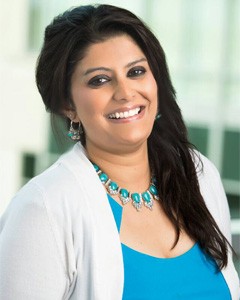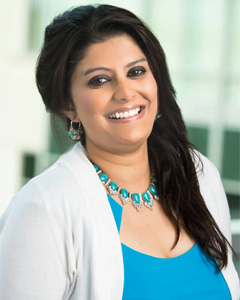
Interview with APU Alumna, Prasida Khanal
The following profile is the fifth in a series of student profiles of our students and alumni at the university.
Job title: Health Services Manager at Community Action Partnership of Ramsey and Washington Counties, St. Paul, Minnesota
Degree earned: Master of Public Health, 2015, American Public University
What led you to choose a Master’s in Public Health?
My home country of Nepal has been crushed with a decade-long Maoist insurgency, political instability, poverty and a humanitarian crisis. These were difficult times for many Nepali families like us, who lost a loved one, or were persecuted or exiled. Amidst the chaos, I was fortunate to receive a scholarship to study dentistry in one of the most reputed universities in Nepal, the B.P. Koirala Institute of Health Sciences. I worked as a community dentist in rural and underserved areas. While I realized that I could improve the oral health status of my people, there was always the chance that they would go back to a house without water or sanitation. During my work in Nepal, there were diarrhea epidemics and women who died during childbirth. These issues encouraged me to take steps forward to improve the health of the public. I feel blessed to have joined APU to help make my dreams a reality.
Tell us about your current position.
I work as a health services manager at Community Action Partnership of Ramsey and Washing Counties in St. Paul, Minnesota. I work with a diverse team of experts to plan and implement health services for Head Start centers. I also ensure that the delivery of health services meets the performance standards as determined by the Department of Health and Human Services.
Has education always been a priority?
Education has always been a priority for me. It creates a foundation for understanding and improving human rights and gender equality. It creates a ripple effect of opportunity that influences generations to come. I was born and brought up in a country where many girls still suffer severe disadvantages and exclusion in education systems. Despite strong cultural norms favoring boys’ education in my country, my parents always made education a topmost priority for me. Education continues to remain a priority for me as it brings a wide range of benefits, not only for the girls themselves but also for their children and their communities, as well as society at large in terms of economic growth.
How do you use what you learned at APU in your current position?
The education and experiences I gained at APU, along with my deep desire for public health service, gave me the tools needed to become a health services manager. There was no way to know that just months after my graduation, I would be putting my knowledge and skills to the test. The evidence-based public health education I obtained helped me realize our interdependence and work through synergistic alliance. The program prepared me to take on a leadership stance while I coordinated health services such as dental, vision and hearing screenings for the children of low-income families. Apart from managing resources, APU’s integrated curriculum encouraged me to take steps to educate others on disease prevention through health promotion and community engagement.
What inspired you to be a champion for gender equality and women’s economic empowerment?
I received the U.N. Volunteer Award in 2013, which provided ample opportunities for me to be involved with multiple Women’s Economic Empowerment (WEE) projects. Global Community Champions for Women’s Economic Empowerment are selected by the U.N. Women Headquarters in New York. The more I worked for the disadvantaged girls and women in Nepal, the more I realized that WEE keeps girls focused on studies instead of hunger. I implemented and witnessed the impact of these employment programs that enable women to dream of a life that is different from the life of their mothers. This was the moment that women’s empowerment became my calling.
My volunteer work with the U.N. Women motivated me to advance the discussion and debate on WEE. WEE directly impacts women’s choices and chances in life pertaining to their health, education, employment and economy. There are a number of opportunities and challenges in the path of women’s economic empowerment. The entire economy survives on the backbone of unpaid work performed by most of the women. I have been driven to make this research visible for policymaking purposes, for fairness and equality. If you are not visible as a worker, then you are not visible in the distribution of benefits. What women do is absolutely crucial to the sustainability and survival of the family. If women are economically empowered, there will be a greater chance that they’ll be valued for what they do.
Have your studies at APU assisted in moving your goals forward?
I am looking ahead at the many opportunities and possibilities that I can achieve with my degree. I was the recipient of the President’s Award in 2015 and I graduated with honors. These recognitions have motivated me to establish “Rebuilding Health” in Nepal. This nonprofit is based on the model I developed for my dissertation. It works on improving community health through public-private partnership and community engagement for sustainable health outcomes. Moving forward, I will be working towards the revitalization of Primary Health Care through the Community Diagnosis Program. Through preliminary evidence, I have found that this model is feasible and can address the “grand challenges” of integrated community health services, especially in developing countries. I sincerely encourage my fellow peers to support emerging and developing countries and their health challenges through knowledge and partnerships. It is a world that awaits your science and your ethics, your ideas and your ideals.
What are some key pieces of advice you would pass on to someone new to online learning?
It just fits! Online learning requires persistence and perseverance. These challenges are temporary and with time and practice, learners will flourish.
What was your favorite thing about online education?
The convenience and how it fit in with my daily life.
What do you like to do in your free time?
I work with my team at Rebuilding Health, which is a non profit that I founded in Nepal. We foster public-private partnership and encourage community engagement for sustainable health outcomes. I also volunteer with the United Nations and multiple nonprofits. In addition, I spend time making ikebana, the Japanese art of flower arrangement. More than simply putting flowers in a container, ikebana is a disciplined art form in which nature and humanity are brought together. It is incredible to remain silent during practices of ikebana. I consider it as a time to appreciate things in nature that we often overlook because of our busy lives.
Online education isn’t a one size fits all, but it’s a great opportunity for those looking to increase their knowledge in current areas of expertise, or to look at new avenues for growth. Our student profile series will give a face and personality to our dedicated online learners at the university. Interested in learning more about your online education options? Explore our schools and programs at APU.

Comments are closed.